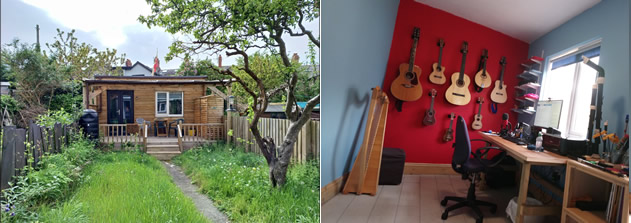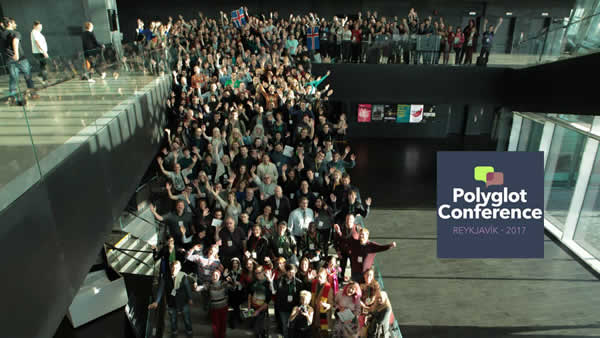
Being the tale of how Omniglot came into being, what my work on it involves, and how I make a living from it.
I have been interested in languages from an early age, and got interested in alphabets and writing systems through collecting stamps and coins. I studied languages (French and German) at secondary school, and at university (Chinese and Japanese), and have taught myself quite few others since then. I also taught myself web design while working for the British Council in Taiwan between 1994 and 1998.
In 1998 I returned to the UK and tried to set up a a web design and translation business. I was going to call it Omniglot, but my dad thought that nobody would know what that meant, as it was a word I made up. So I used the name Multilingual Communciations instead. I built a website for the company, and added details of the languages I could offer.
The business wasn't very successful, but I continued to add information about languages and alphabets to the site, and eventually renamed it Omniglot. After about a year I found a job building multilingual websites for Study Group in Brighton, where I worked until 2008. During that time I continued to maintain and develop Omniglot in my spare time.
In 2003 I discovered that I could get a commission on sales if I put Amazon affliate links on my site, so I set up a book store containing language learning materials and related books. Then I signed up for various other affiliate programs and for Google Adsense, and advertisers started approaching me asking to place paid links on the site. I also get many link exchange requests, and if they are from a commerical organisation that offers language-related products or services, I try to persuade them to pay for links. I haven't actively sought advertising, or spent anything on marketing, apart from printing and distributing business cards. Income from Omniglot started to trickle in at first, and gradually increased as more and more people discovered the site.
After being made redundant from my job in Brighton in 2008, I applied for a job with another company in Brighton, a language-travel agency, and ended up doing some freelance writing for their website. I also picked up some freelance writing work for another website, and was offered a job as a publications manager for a company in Shanghai, which I turned down as I didn't fancy working in China. With the money from the freelance jobs and from Omniglot I was able to make ends meet, though not really in Brighton, which is quite an expensive place to live in.
I'd been thinking about alternative careers for a while, and had considered training as a teacher, or a speech and language therapist, doing courses in languages and/or traditional music, or even joining a circus. I decided to become a speech and language therapist, and worked out that I could do an MA in linguistics first, then do an MSc Speech and Language Therapy. I chose to study linguistics at Bangor University because the course sounded interesting, because the cost of living is quite a bit lower than in Brighton, and because I wanted to be in a Welsh-speaking environment - after many years of intending to learn Welsh, I'd finally got round to it while in Brighton. Before leaving Brighton I had Omniglot registered as a company (Omniglot Ltd), to make things official, and found an accountant.
I enjoyed my time as a student and studied some interesting and useful things, including phonetics and phonology, pragmatics and semantics, sociolinguistics and language disorders. For my dissertation I wrote about the decline and revival of Manx Gaelic, and compared it to other endangered/revived languages, such as Cornish, Irish, Basque, Maori and Native American languages. This also inspired me to learn more Manx and to make regular visits to the Isle of Man. While studying I kept Omniglot going, though didn't always have as much time as I would have liked to work on it.
By the time I finished my MA I was making a good living from Omniglot and didn't need a 'proper' job. So I decided to stay in Bangor and have been there ever since. My income currently comes mostly from adverts on my site, and from occasional donations.
Visitor numbers have built up organically over many years. They reached 100,000 a month in 2004. Since March 2011 they have been over a million a month, and since October 2015 they have been over 2 milllion most months, although they dropped a bit in 2017. After launching the site I registered it with all major search engines, and I make sure pages have relevant meta tags (title, description, etc). Apart from that, my main marketing 'strategy' is telling people I meet about the site and handing out business cards. People can also find out about the site via various offshoots of Omniglot (see below). I do my best to keep the site up-to-date and make regular corrections and improvements, and add new pages every week.
I spend my time adding new material to Omniglot and improving existing content, answering questions, writing blog posts, and making podcasts and videos. I spend the rest of my time doing things like reading, learning and using my languages, playing musical instruments, singing and writing songs and tunes, and practicing juggling and other circus skills.
Since July 2022 I've done most of my work in the office / studio at the bottom of my garden. Before then, I mainly worked in the spare bedroom in my house.

Since 2014 I've particpated in polyglot events around the world, in places such as Berlin, Novi Sad, New York, Montreal, Reykjavik, Bratislava, Ljubljana, Manchester and London. I've given talks and run workshops at some of these events on subjects such as language revival, the origins of writing, introductions of Manx and Welsh, the origins of language, Scottish Gaelic songs and Welsh dances. These events provide opportunities to meet other language enthusiasts, to practice languages and to see different parts of the world, and I thoroughly enjoy them.

Friends sometimes ask me for advice on learning languages, setting up websites and web-based businesses, and on how to monetize existing websites. I do my best to help them.
Offshoots of Omniglot include:
You can hear a podcast I made about The Story of Omniglot here:
About this site | Omniglot - a potted history | About me | My language learning adventures | My musical adventures | My singing adventures | Song writing | Tunesmithing | My juggling adventures
[top]
You can support this site by Buying Me A Coffee, and if you like what you see on this page, you can use the buttons below to share it with people you know.

If you like this site and find it useful, you can support it by making a donation via PayPal or Patreon, or by contributing in other ways. Omniglot is how I make my living.
Note: all links on this site to Amazon.com, Amazon.co.uk
and Amazon.fr
are affiliate links. This means I earn a commission if you click on any of them and buy something. So by clicking on these links you can help to support this site.
[top]